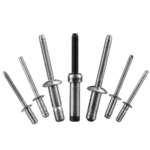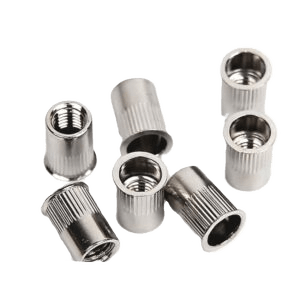Rivet Nut vs Pop Rivet: The Pros and Cons of Rivnut vs Blind Rivet

When it comes to thin sheet joining, the choice between rivet nuts and pop rivets can significantly affect the final riveted joint. It is vital to understand the advantages and disadvantages of both options.
Table of Contents
It is important to note that different riveted fasteners.
They have their own characteristics and advantages. It is vital for professional engineers or DIY users to understand the differences between a rivet nut and a pop rivet.
This blog post delves into the world of rivet nut and pop rivet. We will explore the qualities, pros and cons of each of these two types of fasteners. Additionally, this paper discusses the conditions of use and the results that these two fastener types bring. Understanding these papers is crucial to their suitability for different applications.
After reading this article, you will have a comprehensive understanding of the advantages and disadvantages of rivet nut and pop rivet.
As a successful business owner, you need to be clear in making an informed decision on how to choose the ideal type of fastener for your specific needs. Without further ado, let’s dive in, explore the unique features, and discover the best option for your project.
Types of Riveted Fasteners
When choosing the right connecting fastener for your project, it’s important to know what types are commonly used.Pop rivet and rivet nut have different characteristics and applications. This section explores the definition, characteristics and typical uses of pop rivet and rivet nut. Let’s dive into more information about pop rivet vs. rivet nut.
Pop Rivet
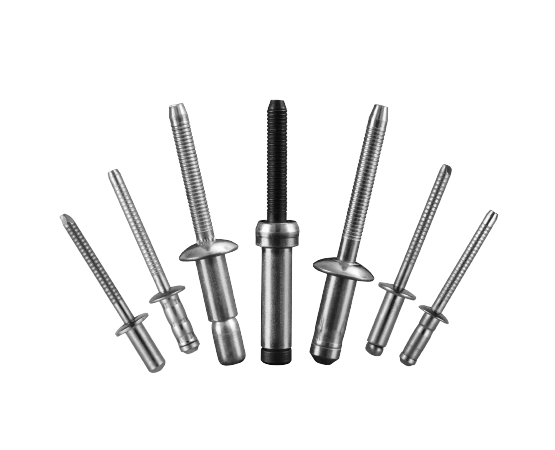
Pop rivet has a fast, consistent connection. Pop rivet is ideal when you need to connect two sheets and make them secure. It is one of the finest connecting fasteners available, and with its quick-connect feature, you can get your project assembled quickly. Aside from its ability to connect and fasten, it can also have various other features such as being waterproof and vibration resistant.
Pop rivet can be made from a variety of materials. Pop rivets can be made from a variety of materials, including aluminum, stainless steel, carbon steel, and copper. It is also important to understand the specific application of the different materials used for pop rivet. Some projects require a high level of material for the pop rivet. The common feature of all pop rivets is their ability to connect quickly.
There are many scenarios in which pop rivet can be used. These include the joining of automotive parts, the joining of aerospace components, and more.
Rivet Nut
The Rivet Nut is a type of fixing commonly used to create threaded connections in thin sheet materials. Unlike Pop Rivet, Rivet Nut is actually a threaded plug that creates an internally threaded hole in the material that can be used to install threaded bolts, screws, or other threaded connections.
Because of these properties, the rivet nut is the preferred choice for certain project applications. Especially when it is necessary to create an internally threaded hole in a material surface. With the rivet nut, you can always be assured that you will have the most secure connection point possible. Not only does it provide a connection point, but it can also link thin sheet materials as well.
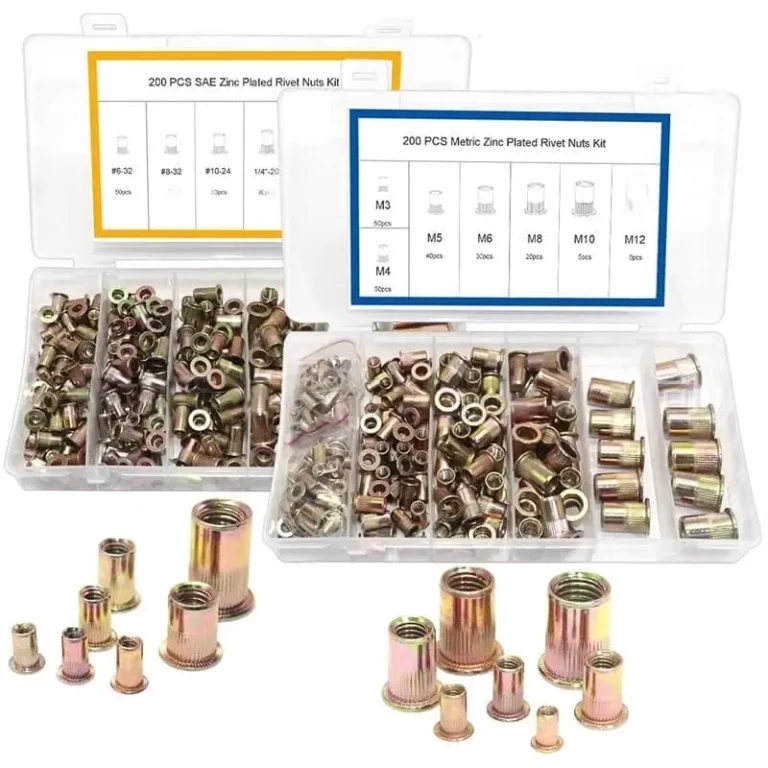
The Rivet Nut is available in a wide range of thread types, including the common imperial (UNC, UNF) and metric (M series) threads. As needed, thread sizes can be selected to fit specific applications.
Due to its unique design and features, the rivet nut has a variety of uses. the most common uses for the Rivet Nut include threaded joints or plate reinforcement. This is because it provides a reliable threaded connection point that can be used as the basis for other fastening connections.
In conclusion, it is vital to understand the differences between pop rivet and rivet nut. Additionally, it is vital to understand their uses, which will help you make an informed decision when choosing the right connecting fastener.
Pros and Cons of Pop Rivets
Pop rivet is an extremely convenient and fast fastener, which makes it a prime choice for a variety of applications. Here are some of the pros and cons of using pop rivet:
1.Pros of Pop Rivets
1) Quick Installation: Pop Rivet’s installation process is relatively simple and quick. With the use of specialized tools, rivets can be quickly installed on the material, increasing productivity.
2) Blind Rivet Capability: Pop Rivet can be used as a blind rivet fixing in situations where it is not possible to work from the other side of the connection. This makes it suitable for use on the backside of the joining material or in areas where direct access is not possible.

3) Cost Savings: Pop Rivet is often an affordable fixing solution. Compared to other joining methods such as welding or threaded connections, it is less expensive, especially in mass production.
4) Lightweight: Pop Rivet is usually made of lightweight materials (e.g. aluminum), which makes it possible to reduce the overall weight when joining materials, which is very advantageous for applications requiring lightweighting.
2.Cons of Pop Rivets
1) Difficult to Remove: Pop Rivet is a one-way connection that cannot be easily removed once installed. If the connection needs to be removed or replaced, the rivet may need to be broken or cut.
2) Limited Connection Strength: Pop Rivet may have a lower connection strength than some other connection methods such as welded or threaded connections. This makes it potentially less suitable for demanding applications that need to withstand high levels of tension, shear or vibration.
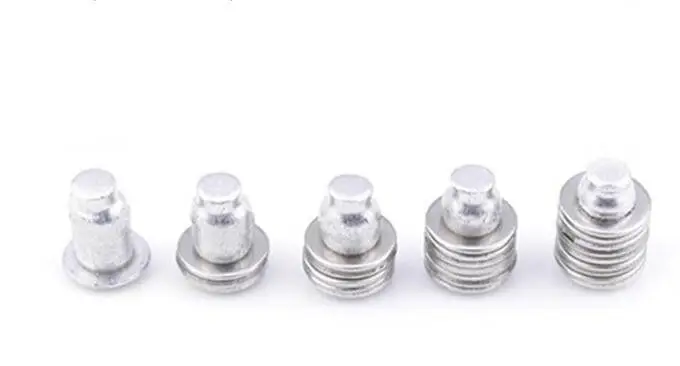
3) Limited by material and thickness: Pop Rivet is suitable for joining thin sheet materials, but its use may be limited for thicker or harder materials. In these cases, other more robust joining methods may be more appropriate.
4) Specialized Tools Required: The installation of Pop Rivet usually requires the use of specialized tools, such as the Pop Rivet Tool. This can add to the cost of the tool and complexity of operation.
Pros and Cons of Rivet Nuts
Just like pop rivet and other fasteners, rivet nut has some pros and cons. In this section, we will outline the pros and cons of the rivet nut and continue with an in-depth discussion of the rivet nut.
1.Pros of Rivet Nuts
1) Threaded Connection Capability: Rivet Nut creates a reliable threaded connection in thin sheet materials. It can be used as a base for installing threaded bolts, screws, nuts or other threaded connections, providing a solid threaded connection.
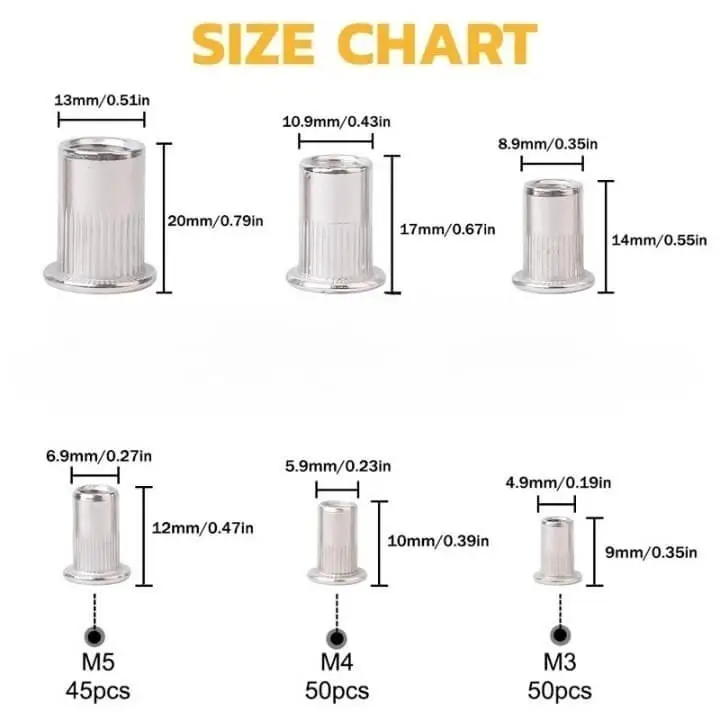
2) Reinforcement effect: Rivet Nut reinforces the structure of thin sheet materials. By installing the Rivet Nut on a thin plate and tightening the threaded connection, the strength and stability of the plate can be increased.
3) Reversible disassembly: Rivet Nut provides reversible connections, making the assembly and disassembly process easier. It is suitable for applications that require frequent repairs, replacements or adjustments.
4) Multiple Material Suitability: Rivet Nut is suitable for use on a wide range of materials, including metals, plastics and composites. It can form reliable threaded connections on different types of materials.
5) Distributed Load: Rivet Nut’s threaded connections provide a more evenly distributed load than traditional rivet connections, reducing the possibility of localized stress concentrations.
2.Cons of Rivet Nuts
1) Installation Tool Requirements: Installation of the Rivet Nut usually requires the use of specialized tools such as manual or pneumatic Rivet Nut tools. This can increase tooling costs and operational complexity.
2) Relatively Complex Installation Process: Installing a Rivet Nut requires a number of additional steps and techniques, including drilling, press-in, and press-fastening, compared to the installation process using traditional rivets. This may require some training and experience.
3) Limitations on Thickness and Hole Size: The use of Rivet Nut is limited by the thickness of the material and the size of the hole. Materials that are too thin may not provide adequate threaded joint strength, and holes that are too large may not allow the Rivet Nut to fit securely.
4) Relatively Low Connection Strength: The Rivet Nut may have a relatively low connection strength compared to some other connection methods, such as welded or threaded connections. This makes it potentially less suitable for demanding applications where high tensile, shear or vibration forces need to be withstood.
Rivet Nut vs Pop Rivet: Conclusion
As a business owner or purchasing engineer, your choice between pop rivet and rivet nut greatly affects the end result when purchasing for your project. It is critical to understand the pros and cons of each fastener type. This allows you to make an informed decision based on the specific needs and desired outcome of your project. Keep in mind that there is no one-size-fits-all answer when it comes to choosing a pop rivet or a rivet nut. It depends on the specific project requirements and application requirements.
Discover Perfect Fastener for Your Business with Rivmate!
Looking for reliable pop rivet manufacturers and rivet nut manufacturers for your industrial projects and customer businesses? Look no further. At Rivmate, we are committed to helping businesses solve their sourcing needs in rivet fasteners once and for all. We are committed to helping our customers buy high quality pop rivet, rivet nut and self clinching fastener in bulk.Contact us today and tell us more about your requirements.

